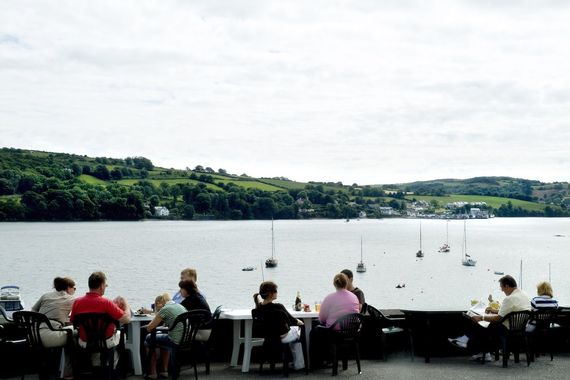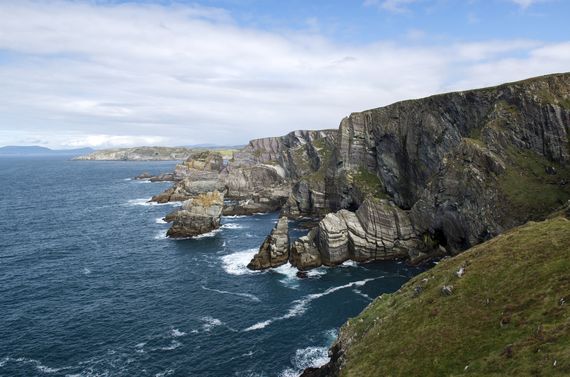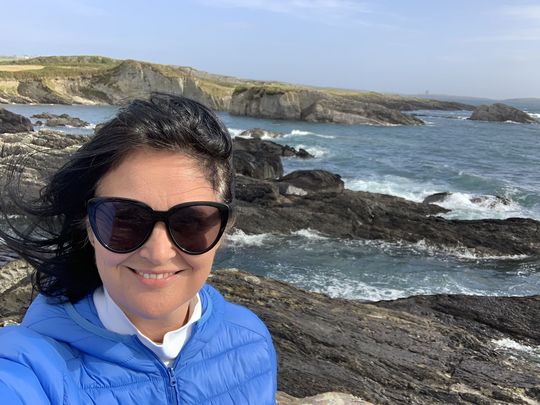The daffodils are up in West Cork, spring is on the salty Atlantic air, the next bank holiday is St. Patrick’s Day, the most important national holiday in Ireland, and the most important Irish holiday around the world. This year, for the first time, I’ll be Irish.
I wasn’t born with much of a claim to Irishness. There are a smattering of Irish names in my family tree, but I’m basically a mutt of an American, from a family who first set foot on the Eastern seaboard so long ago we’ve lost all ties to “the old country”. Rather, I moved to Ireland over ten years ago, when I married an Englishman living in West Cork.
My first impressions of rural Ireland were colored by that man’s severe house and haughty approach to the local community. He wrote for glossy British magazines and called the modest Christmas party he held for a few neighbors the “staff Christmas lunch” and one neighbor, who helped with some chores, his “swineherd”. That Englishman and I were together for seven years, and for six of those seven years, summer never came, just a steady rain and a flat despairing fog.
Read more
Then we broke up, and, thanks to some elaborate legal contrivances, I was left homeless. I could have gone back to America. There was every reason to but I knew if I went, I wouldn’t be able to readily come back, and something tugged at me. I longed to stay in Ireland.
So, I rented a little cottage by the sea in West Cork, a sheltered haven with a garden full of birds. I spent a year studying to be a psychotherapist in Cork. I also spent that year being savagely divorced, as my soon-to-be-ex twisted himself in knots trying to get me thrown out of the country. My ex-husband was, as a friend once said, “a worthy adversary” and I had awkward, apologetic late-night visits from Gardai [Irish police] obliged to investigate his increasingly implausible tales. Then he turned our English friends against me: people shouted down the phone and spread rumors behind my back. People I’d known for years, people I’d fed at my table, crossed the street when they saw me. It was a difficult time.
But Ireland held me.

Glandore, in West Cork, on a summer's day.
Behind the little cottage I’d rented and up a hill was a vast plateau that fell away in a great cliff to the long shining stretch of the Atlantic. The first night I spent in the house, I heard a roaring and mistook it for the sound of a highway – but I was on a peninsula, surrounded by water, with only a rutted dirt track to my door. It was the sound of waves as big as houses, crashing on the cliffs.
In the middle of that windswept plateau overlooking the sea were warren-like ruins, twisty tumble-down dwellings with mud floors. Here, I learned, one winter day when I was feeling particularly heartbroken, hundreds of people died of starvation during the Great Hunger. I was reminded not to feel sorry for myself. I was blessed to have a warm house and a full belly; the ghosts of those children, women, men, told me so.
Down the little dirt track from the house was a village. In the village was a shop, owned by the same family for many generations. When I marketed there, this family smiled and remarked on the weather and asked after me. Across the road from the shop was a pub, and there I met new friends and laughed over pints and five-euro fish and chips on a Friday. Along the street, in the village, was a fishmonger, where the fishermen joked and teased me. These simple, gentle moments got me through many hard days.
And that was only the beginning. People loaned me their cars, their houses, the very clothes off their backs. They invited me to celebrate Christmas, birthdays, New Year’s Eve. Neighbors dropped in with fresh bread and eggs from their chickens. They turned on my porch lights on dark winter nights, knowing I’d be home late. In contrast to my ex’s cruelty, a million acts of generosity shone.

Mizen Head, in West Cork.
Every summer, starting with the first summer my ex and I were apart, the sun reigned extravagantly, excessively, burning the farmers’ arms and the backs of their necks, blistering the noses of white-skinned ponies. It was a shock to us all, but we soon adjusted and celebrated every gleaming summer’s day like a festival.
The magnificent beauty of the shores of southwestern Ireland; the country’s long, layered, tragic, triumphant history; and the thousand times one thousand kindnesses of its people, many of them strangers. These things kept me in Ireland and kept me alive.
I became an Irish citizen in December 2021, after more than ten years of living in West Cork and more than two years of working my way (with lots of very patient help) gently through the pre -and then post-covid bureaucracy of the Irish Ministry of Justice. I earned my citizenship through a long residency, but the decade was more than a residency; it was an apprenticeship, as for more than ten years I’ve been an acolyte trying to understand the subtle complexity of this beautiful nation I’m lucky enough to call home.

Are you planning a vacation in Ireland? Looking for advice or want to share some great memories? Join our Irish travel Facebook group.
This article was submitted to the IrishCentral contributors network by a member of the global Irish community. To become an IrishCentral contributor click here.




Comments